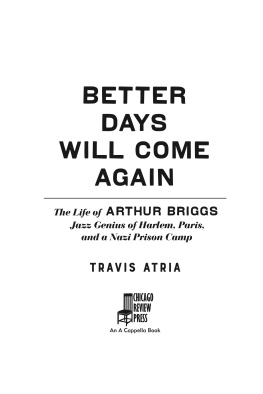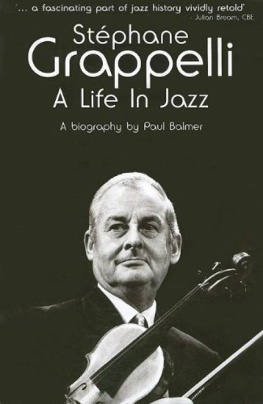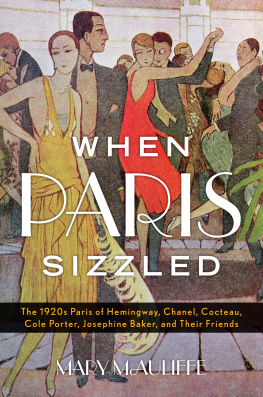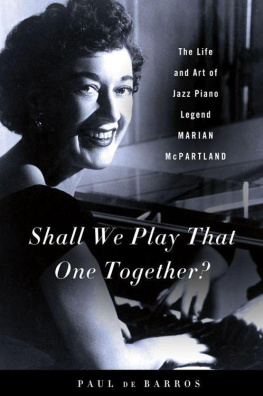Preface
by Barbara Pierrat-Briggs
WHEN I WAS BORN IN 1960, the first and only child of Arthur Briggs, my dad had already lived a full, eventful, and even extraordinary life. He was fifty-nine years old. He was recognized as a master trumpeter in both jazz and classical music. He had been accepted into the fraternity of pioneering jazz musicians in Harlem, New York, and Paris during the first golden age of jazz. He had forged a career as a hot trumpeter, vocalist, bandleader, and educator in Europe. And he had survived a Nazi prison camp during World War II.
Despite this astonishing life, my dads storythe true storywas never told. The few attempts to do so were full of useful fictions and protective suppressions that my dad thought necessary. Throughout his life, these fictions and suppressions facilitated his growth and even ensured his survival, but they left jazz scholars scrambling to find the truth. Additionally, because he spent most of his ninety years in Europe, he was largely left out of Americas historical record of jazz, leaving him unknown despite his massive achievements.
That is, until now.
Some years ago, author Travis Atria contacted me for permission to write an authorized biography on my dad. He was not the first person to approach me about my dads story, but generally the long procession of writers, producers, and filmmakers over the years seemed more interested in their desire to tell the story than they were in my dad having lived it. Travis seemed different, particularly because hed already done so much independent research. So, I phoned my cousin James Briggs Murray, a retired curator of music, film, and broadcasting at the New York Public Librarys Schomburg Research Center, asking that he investigate Traviss professional background and give me an opinion. My cousin researched and read Traviss previous works, had a meal with him, and reported back that, among other publications, Travis had authored the essential book on R&B singer/songwriter, Curtis Mayfield, Traveling Soul: The Life of Curtis Mayfield (Chicago Review Press, 2016), with whose music my cousin was very familiar. He reported that Traviss treatment of Mayfield was accurate, thorough, insightful, respectful, musically analytical, and done with the appropriate social, cultural, and political context. In my mind and heart, these were exactly the characteristics I wanted in any book about my dad.
I met Travis in Paris in August 2017. Along with cousin James and our families, we spent a few days in serious conversation as we enjoyed good French food and wine. After those meetings, I decided to let my fathers story, which I had protected so carefully since his death in 1991, finally be told. This book project, intended to fill an important gap in the documented history of jazz, is the result of Traviss tenacious investigation and Jamess and my added historical and family insights. But, for me, and for our entire family, this was not just a book projectit was an opportunity to tell the full and true story of our beloved Arthur Briggs at long last.
My dad was a gentleman and a modest man who had no tolerance for unfairness and wickedness. As a religious man, he prayed every day, but he was open-minded in accepting people and their belief systems. When I was two years old, after nearly a half-century of nonstop touring and performing, he retired in order to take care of me. My mom, thirty-four years his junior, was in the early years of her working career. So, it was my dad who got my day started and who picked me up from school in the afternoons. Unlike my classmates, who were taken straight home after school, my dad and I would normally stop at the bakers for cakes and hot chocolate before heading home. When we reached home, not only did my dad help me with my homework, he also cooked for me and played with me. He even knew all of my dolls by name. My dad was the fulfillment of my moms life. He was a husband, somewhat of a father, and especially a friend to herdespite, and perhaps in some ways, because of their significant difference in age. They were inseparable. When he passed away, she was never the same.
My relationship with my dad was always loving, caring, and respectful, from my earliest childhood memories to my still vivid adulthood memories with him. I shall always remember our closeness together, our honesty with each other. I was full of admiration for him as a father, as a human being, as a musician, and as a man. That love, now extending and manifesting itself in the love I share with my husband, Denis, and our son, Stanley Arthur, remains at the core of my being.
Today, as a schoolteacher, I work five kilometers from the Nazi detention center in which my dad was held for nearly four years. I sometimes try to imagine what it took for him, after such a prominent musical career, to withstand the horrors of detention, to play Beethoven for the Nazis who hated jazz, and to play jazz for his fellow detaineesall while he was a prisoner of those who thought him inferior because of his skin. How did he emerge from years of wicked detention, never knowing if each day would be his lasthow did he emerge from that hell with his mind, heart, and spirit so intact that he spent the next several decades as a respected professor of music, a devoted husband, and a loving father?
When your journey through this book is complete, I hope you will have come to understand the answers to these questions, and to appreciate the man who was a giant in my eyesthe man who was indeed a giant of jazz musicmy father, Arthur Briggs.
THERE WERE TEETH IN THE SOUP AGAIN, horse teeth. It was repulsive even to a starving man, and Arthur Briggs was a starving man. Hunger was a song stuck in his head as he shivered in a filthy hut, lice crawling on his skin. Evenings were once filled with jazz and risqu dancing, with gaiety and tumbling laughter, with champagne and fine cuisine. Now it was winter. He was hungry. And there were teeth in the soup again.

